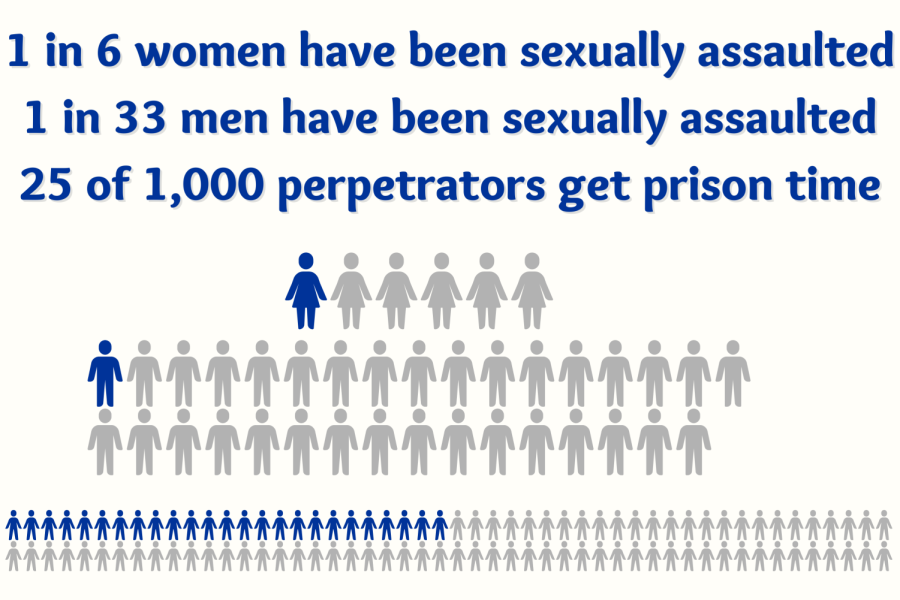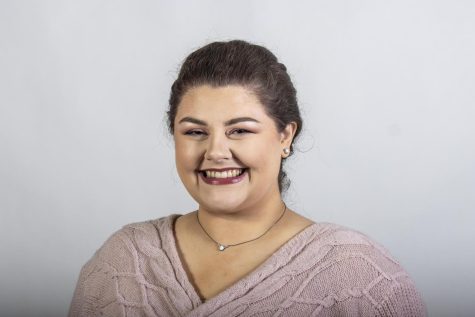EIU students speak out on sexual assault experiences
Statistics from the Rape, Abuse, & Incest National Network.
April 18, 2023
Editor’s Note: This article includes mentions of sexual assault and harassment with statistics and specific details from others’ experiences.
Eastern students anonymously broke the silence on their stories of their sexual assault and harassment experiences to help spread awareness during Sexual Assault Awareness and Prevention Month.
Every 68 seconds, an American is sexually assaulted. Every nine minutes that victim is a child. However, only 25 out of 1,000 attackers face imprisonment, according to the Rape, Abuse, & Incest National Network, RAINN.
Sexual assault and harassment is a issue organizations like RAINN, or more locally, Sexual Assault Counseling and Informational Services, SACIS, try to combat with awareness and prevention.
According to RAINN, sexual assault and harassment on campus or involving traditional college-age adults is higher then other adult age ranges nationally.
Thirteen percent of all graduate and undergraduate students experience sexual assault. Within undergraduate students, 26.4% of women and 6.8% of men experience sexual assault while 9.7% of women and 2.5% of men who are graduate or professional students also experience assault during their time as a student.
Along with sexual assault, 5.8% of students experience stalking cases since they began college, according to RAINN.
With college-age adults who are not in college, the risk is still high, but higher for men
18 to 24-year-old women who are not in college are approximately 20 percent less likely to be sexually assaulted then female college students.
However, 18 to 24-year-old men are around 78 percent more likely to be sexually assaulted compared to male college students, according to RAINN.
Some members of the Eastern community were assaulted on campus or off campus.
A senior vocal performance major said they have experienced both sexual assault and harassment on campus.
“My freshman year at EIU, I was groomed, emotionally abused, mentally abused, sexually assaulted and sexually harassed by an older member of the campus ministry I was attending,” they said.
The vocal performance major said the person who assaulted them evaded meeting with Student Accountability and the Coles County state’s attorney’s office never filed charges against him.
They recommended for Student Accountability to in some way not allow those accused to put off meeting until after the accused graduated.
A senior neuroscience major said she was assaulted in Thomas Hall her freshman year.
She said when she reported the assault, she was not taken seriously.
“I was told that because I was in a relationship with the person, it should have been consensual,” she said. “He was made an RA on campus, and I only got a no contact order when I found out he was stalking me”
The neuroscience student also said her experience with Student Accountability was a negative one.
“Student Accountability never followed up with me because housing told them the situation had been resolved when it wasn’t,” she said. “Student accountability should reach out to the survivor of these situations when a report is made, regardless of if another department says it has been dealt with. The goal should be helping survivors process this trauma and feel safe on campus.”
A senior early education/special education major said she had been sexually assaulted before and has experienced being touched, groped, grabbed and kissed without her consent. She said the experiences had occurred while she was an Eastern student, but not on Eastern’s campus.
Eight out of 10 sexual assault victims knew their attacker with 39 percent of attackers being an acquaintance and 33 percent are a current or former spouse, boyfriend or girlfriend, according to RAINN.
A sophomore political science major shared her experiences of sexual assault and harassment with an ex-boyfriend when she was younger.
“I had an ex-boyfriend who would coerce me to do anything sexual,” she said. “Anytime I said no to him he would try and convince me otherwise. I was scared of him because I was only 15/16 and he was 17/18, and he was my first boyfriend. And he said he loved me.”
The political science major described a specific instance where her ex-boyfriend assaulted her while she was asleep.
“He constantly talked about how deep a sleeper I was and how I would never wake up at night,” she said. “Only one night for me to wake up to him putting his hand down my pants. I think he’d done it before, but that was the only time I woke up to it.”
A junior nursing major said she has also been assaulted and harassed by an ex-boyfriend before when she was in high school.
“I was sexually assaulted in highschool by an ex-boyfriend,” she said. “We were trying to fix things so I went to spend the night with him. I woke up in the middle of the night to his hand in my underwear, and I told him to stop. I went back to sleep and woke up again to the same thing. I ended up staying, and I didn’t even realize the weight of the scenario until months and months later. Almost 4 years later, I am still dealing with the ramifications. I have panic attacks when I see people who look like him or drive his car. I have an extreme fear and distrust of men. It also impacts my current, long term relationship when I am having bad days. Intimacy is hard now.”
The nursing student said people should always believe the victim.
“Always believe the victim, even if you have your doubts,” she said. “It’s better to believe the victim than not.”
She further said significant others can assault individuals too.
“You can be sexually abused and assaulted by your significant other,” she said. “They do not own your body, and they are not entitled to it.”
A senior English major faced abuse and was sexually assaulted by her boyfriend during her time at Eastern.
She said others “believed I was lying even with proof of bruises all over [my] body.”
The English student said sexual assault and harassment can happen to anyone not just women.
“I feel like there’s a huge ignorance of male sexual assault victims, and they need assistance too,” she said.
One in 33 men have been sexually assaulted according to RAINN. The National Sexual Violence Resource Center says around 81 percent of women and 43 percent of men experience sexual harassment or assault.
A sophomore public health major said he has been sexually harassed before, which shocked him.
“I’ve had my butt grabbed by two girls in the past, and it was in front of my sister, I felt really shocked by it,” he said.
A senior special education major said she experienced both sexual assault and harassment. She said she was assaulted in her dorm bed her sophomore year.
“[It] was meant to be just hanging out but instead he wanted something I wasn’t wanting to give and took anyway in my dorm on my bed sophomore year,” she said. “Because of that I have PTSD and attempted suicide because I hated myself for it.”
She advised for Eastern to have faculty or administration talk about sexual assault prevention and what to do if it happens since she has never had anyone talk on that.
A senior psychology major said they never reported their sexual assault because they were older then the assaulter, and the assaulter threatened to claim statutory rape against them.
“I was assaulted when I was 17 by someone who was 16, and so I couldn’t report because they threatened to try to turn it on me for ‘statutory rape’ despite me being the one who was assaulted,” they said.
They had previous and following sexual assault and harassment experiences as well.
“When I was 15-18, I was targeted, groomed and harassed by men constantly online,” they said. “From 18-20, I worked as a cook at a bar and was physically harassed and assaulted by men who would grab at me and make comments on doing things to me sexually. A lot of these men had kids my age that I went to school with. I reported it to multiple people (including my uncle who was the owner of the bar) and was brushed off. ‘You should get used to it.’ ‘It comes with the territory.’ ‘It could be worse.’ These are just some of the comments that I experienced.”
The psychology student went on to list the different everyday habits they have changed following their assault and harassment experiences.
“When I used to be able to walk, I never walked alone at night,” they said. “If I did, I had my keys in my fingers like brass knuckles and called a friend to be on the phone with me until I got to a location. I check my car before I enter it so people aren’t there. I triple check locks on doors. Previously when I lived in [my old apartment in Yorkshire Hall], the lock on our door was finicky and would unlock if you jiggled it enough, and I was constantly stressed about it. I can’t have anyone touch my neck without explicit permission and circumstances. I can’t have people sneak up on me without risking an anxiety attack. As a disabled person, I especially feel vulnerable at all times as I’m an ‘easy target.’ I keep my ice pick on my cane at all times of year in case I were to be attacked. I could write a paper on habits that have changed due to my experiences.”
They said people should give victims the benefit of the doubt.
“It’s hard as —- to talk to people about it and to come forward,” they said. “When people do come forward, they are scrutinized and blamed which solidifies the idea that they aren’t able to speak up. From people who have told me their experiences, nothing is done after a long exhausting process.”
Madelyn Kidd can be reached at 581-2812 or at DENeic@gmail.com.





































































